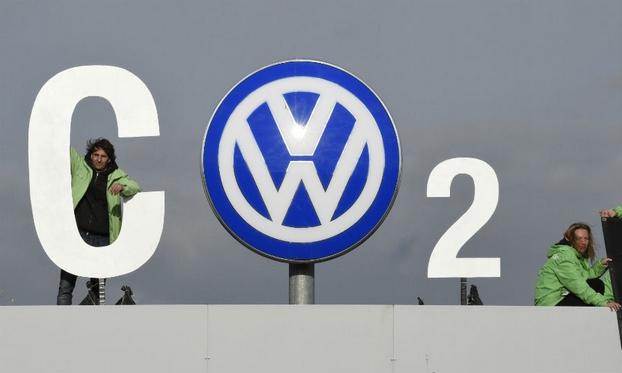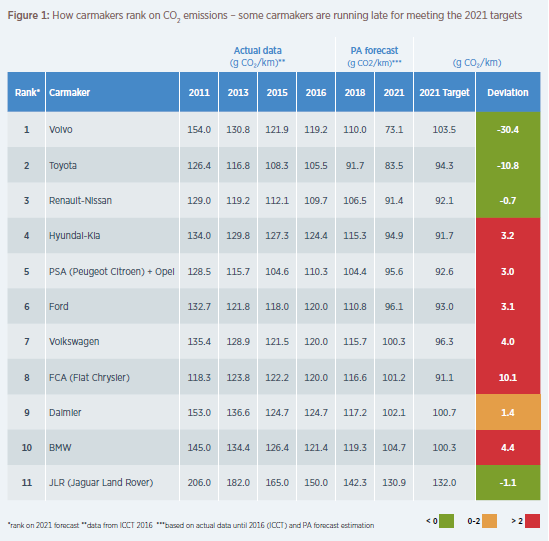Will the masses and other car companies in 2021 or heavy penalties be able to turn the tide?
According to foreign media reports, according to a report released by a consulting company, most car companies in Europe are unable to meet the EU's upcoming implementation of the vehicle's nitrogen oxide emission standards, and therefore will face large fines. PA Consulting ranked according to the extent to which new cars sold by auto companies meet the EU's CO2 emission reduction targets. The European Union requires that the average CO2 emissions per kilometre by 2021 reach 95 g, compared with 118 g/km last year. At present, only three car companies out of 11 car companies, namely Volvo, Toyota, and Renault Nissan, can basically meet the standards. Vehicles with excessive emissions will face a fine of 95 Euro per gram. Volkswagen Group, FCA, PSA, BMW and Ford could not meet emission standards. Based on the data provided by Boan Consulting and the sales data provided by Jato, the following are the fines that each car company may face in 2021: Volkswagen Group: 136 million euros FCA: 950 million euros PSA/Opel: 786.7 million euros BMW: 430 million euros Ford: 3.071 billion euros Hyundai Kia: 2.831 billion euros Daimler: 126,200 million euros In the report, Boan Consulting stated that along with the increasingly stringent energy-saving and emission-reduction standards and the impact of technologies such as autonomous driving, car companies are facing an industry that has almost been reshaped. In this regard, car companies have successively formulated new plans to increase the sales of new energy vehicles. However, Boan Consulting stated that the initial stage of the car company's policy has minimal impact on sales. In spite of this, few automakers can quickly change the product lineup of their models to meet the EU's 2021 CO2 emission target and avoid being subject to heavy fines. The author of the report, Thomas Goettle, Chief Automotive Analyst at Boan Consulting, said that car companies will try to humanize measures to avoid fines as much as possible, and this is also the first priority for car companies. With the approach of 2021, the momentum of car companies to meet standards has also declined. The EU reported that last year's CO2 emissions fell to 118g/km, the lowest in nearly 10 years. The European Union has also been seeking ways to reduce CO2 emissions in response to climate change. The EU stated that in the European market, the vehicle's exhaust emissions account for 12% of the total CO2 emissions. Goettle said that one of the reasons for the increasingly stringent emission standards is the impact of the Volkswagen emissions gate incident, which has also caused the car companies' future plans to fall into a "chaos." Prior to this, outsiders also speculated that diesel vehicles still play a very important role in meeting emission standards. However, the sales of diesel vehicles in Europe accounted for less than 50%, and with the announcement of the ban on the sale of diesel vehicles in London and Paris, the sales of diesel vehicles will further decline. France, Britain and Norway have announced that they will ban the sale of gasoline and diesel vehicles in the coming decades. He also said that after the emissions gate incident, the industry also clearly realized that electric vehicles are the best way to meet emission standards. At the Frankfurt Auto Show this year, many people in the industry also gave a positive attitude to electric vehicles. But in addition to a small proportion of pure electric vehicles, the most effective solution is a 48V mild hybrid system. Goettle revealed that Volkswagen, Volvo, PSA and Daimler all plan to use this technology in their models. Under the emission standard of 95g/km, 11 car companies set separate targets according to their products, from 91.1g/km set by FCA to 103.5g/km set by Volvo, but the target of Jaguar Land Rover is relatively low. The high, which is 130g/km, is mainly due to its sales in European market less than 300,000 vehicles. In recent years, many car companies have been fined for failing to meet emission requirements. In 2013, Ferrari was fined 1 million euros and Volga was fined 20,000 euros. The biggest gainer is Volvo. Its ranking has increased by 6 compared to last year. It is estimated that by 2021, CO2 emissions can be reduced from 119 g/km in 2016 to 73 g/km. The PSA Group, which took the top spot last year, slipped to the fifth place and is expected to be 3g/km far behind the standard. This was mainly due to the termination of the diesel hybrid project and the acquisition of the Opel brand. Goettle said: "What PSA needs to do now is to compare Opel's and PSA's engine configuration and remove those that are relatively inefficient. In the future, PSA does not require two different engine development platforms." Toyota and Renault Nissan are still ranked second and third. Toyota is relatively easy to meet standards. Its average emissions in 2016 was 105.5 g/km, which is the lowest in Europe. Renault Nissan has invested billions of dollars in electric vehicle technology over the past ten years and launched two best-selling electric vehicles in the European market, namely Renault Zoe and Nissan Leaf.
Providing fully custom Folding Carton with difference color, size, and structure. They are also many colors for your choose. We can do difference color as client requirements. And make Silk Screen Printing as the graphic of client. Drawing for customer's structure and create artwork for client's graphic, high level quality control to keep timing.
Folding Carton Folding Carton,Stacking Gift Boxes,White Cardboard Gift Boxes,Folding Boxes DongGuan LongTen package Products Co. Ltd , https://www.longtenpack.com


